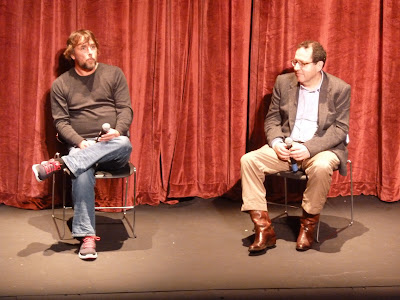I’ll admit that it’s easy to lack something to say on this particular day. I started writing this early Friday as developments in Boston competed for my attention. Wild reports were beginning to surface about what sounded like a city turned upside down as the hunt for the marathon bombers continued. And yes, it sounded like something out of an action movie, although more and more that comparison seems increasingly lazy.
The thing is, the film festival environment is largely a haven from all this sort of news. Sure, I attempt to keep up with Twitter between movies, but that amounts to rapid scrolling through my feed. Otherwise the theater--and it’s just one location at Ebertfest--is a virtual bubble, as is the community of people around it. It’s not as though one can’t keep up with what’s going on in the larger world but that it’s nice to be in a self-contained space for a little while. Isn’t that part of the appeal of the movies, to inhabit a mental landscape where the outside world disappears for a couple hours, even if what is on the screen relates strongly to reality.?
Thursday’s four films--three features and a short--kept the real world close at hand. The festival director’s daughter co-directed the short TO MUSIC, which included Ebertfest regular Paul Cox in a small role. The theme of becoming absorbed in art, not as a way of shutting out but enhancing life, seems ever so applicable with what surrounds the festival this year.
I’ve not shared Ebert’s enthusiasm for Cox’s films, and when it became apparent that VINCENT: THE LIFE AND DEATH OF VINCENT VAN GOGH would be John Hurt reading the artist’s letters to his brother over experimental imagery, recreated period scenes, and footage of Van Gogh’s drawings and paintings, part of me despaired prematurely. 99 minutes of this?! While some of the nature b-roll wasn’t evocative of anything in particular, tracking the artist’s development and interior life in such a manner turned out to be instructive. Off the top of my head, I don’t think I’ve seen anything quite like this mixture of biography and art history. Cox invites a new way of seeing Van Gogh’s work, whether through juxtaposition of the items and places that inspired what he put onto canvases or noting the gradual stylistic shifts.
 |
| Kevin B. Lee, In the Family's Patrick Wang and Trevor St. John, and Michael Barker |
This was my second time seeing IN THE FAMILY, and I was struck again by how empathetic it is to all parties. In telling the story the way that he does Wang reveals a clear perspective on how such family struggles should be handled, but it never feels like he’s pushing an agenda. The tension exists on an interpersonal level but lacks nastiness. Blame is accepted on both sides. It’s simply scared people reacting to protect what they feel needs preserving.
As writer, director, and star Wang gives the story and performances room to breathe. For the most part it’s a successful approach that deepens the connections even while a lot of the family history is inferred and implied. Some scenes stretch out beyond their usefulness, but the length and deliberate unfolding of the plot are integral to the payoff in an extended deposition scene in the final act.
 |
| Bernie's Richard Linklater and Michael Barker with Jack Black by phone |








